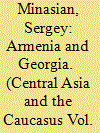| Srl | Item |
| 1 |
ID:
162988


|
|
|
|
|
| Summary/Abstract |
US-Russia relations stand at a complicated juncture today. While Trump thinks he can get along with Putin, US Congress has a very different perception of Moscow. This contradiction shows up in the promulgation of US Congress’s Countering America’s Adversaries through Sanctions Act (CAATSA), which targets Russia and was signed into law by Trump last year despite his reservations.
|
|
|
|
|
|
|
|
|
|
|
|
|
|
|
|
| 2 |
ID:
118728


|
|
|
|
|
| Publication |
2012.
|
| Summary/Abstract |
Relations between Armenia and Georgia go back many centuries into the history of these two neighboring nations. The recent history of their relations as two post-Soviet newly independent states is only two decades old, which means that certain problems have not yet been resolved.
Both countries have to cope with political, ethnopolitical, economic, linguistic, and religious problems; the situation in both countries is further complicated by the far from simple processes of nation-building and the countries' involvement in bloody ethnopolitical conflicts in the Caucasus. This has inevitably affected the political and socioeconomic development of both Armenia and Georgia.
|
|
|
|
|
|
|
|
|
|
|
|
|
|
|
|
| 3 |
ID:
170599


|
|
|
|
|
| Summary/Abstract |
The present paper discusses the so-called “Russian factor” in the political development of Japan over a period from the late 19th century till the present day. The rise and fall of Japan as a “great power” in the 20th century is tightly linked with its relations with Russia (the Russian Empire and the USSR), which became a specific factor of the Japanese imperial project. Russia served as a challenge to Japan that triggered its social mobilization and militarization in 1895-1905. The victorious Russo-Japanese War made Japan a “great power” with colonies on the continent. However, it also predetermined the political rise of its military circles, which ultimately worked as a time bomb breaking the foundation of the newborn empire. Cooperation with Russia after 1906 was the most effective instrument for Japan’s further expansion on the continent, while the intervention into Siberia after 1917 came as the first alarm signaling the limits of that expansion. The paper also examines the harsh geopolitical rivalry between the two countries during the 1930s, “strange neutrality” during WWII, and the Soviet-Japanese war in August 1945 as the final factor that brought Japan to a surrender and drove the final nail in the coffin of its imperial project. The study shows an unprecedented transformation of Russia’s image in Japan over the years and analyzes the Russo-Japanese territorial dispute in a new perspective.
|
|
|
|
|
|
|
|
|
|
|
|
|
|
|
|